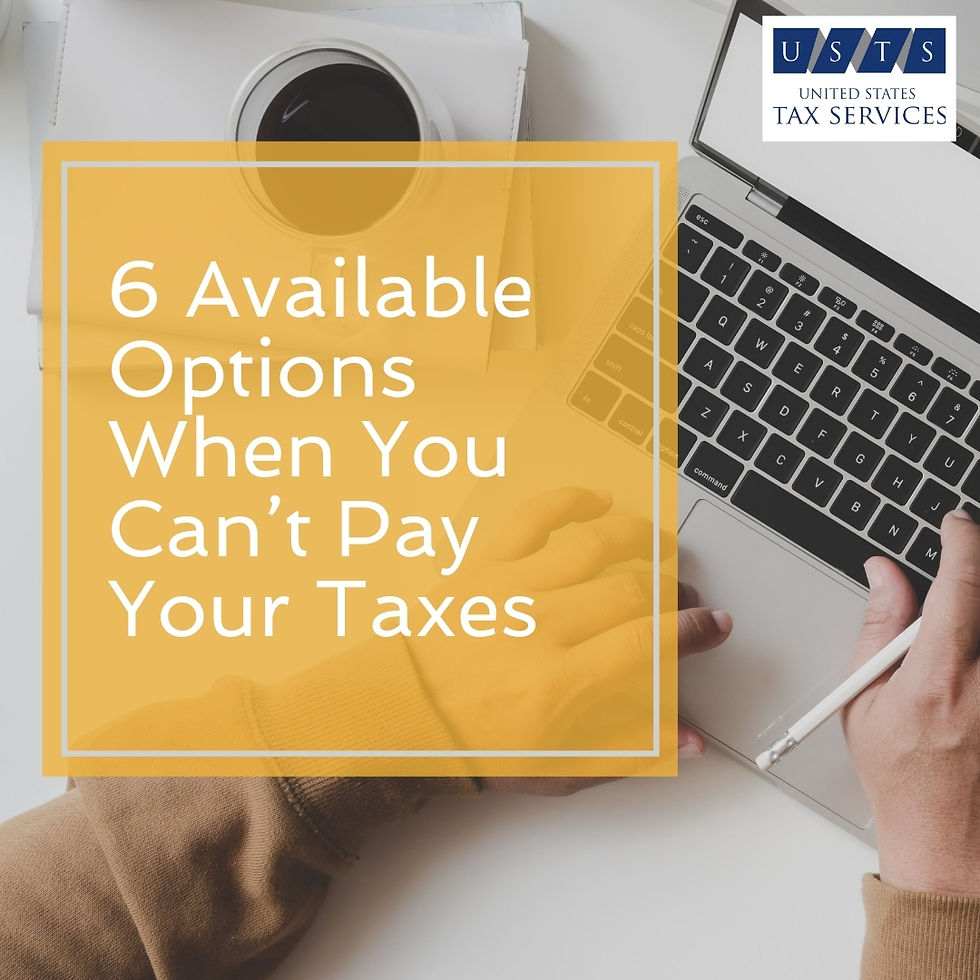16. 6 Available Options for When You Can’t Pay Your Taxes
- US TAX SERVICES
- Oct 9, 2021
- 3 min read

This article is about common regulations and your options. The impact of COVID-19 is not included.
Many taxpayers look forward to receiving a refund from the U.S. government when Tax Day arrives each year. Some people see it as a looming deadline when their bill is due.
If you discover that you will owe taxes when filing your return, then it is essential that you still get the paperwork completed in time. The IRS often allows individuals to pay their remaining balance through monthly installments with a contracted agreement. Some households may even qualify for a settlement through the Offer in Compromise program.
These are the options that are available right now if you discover a tax bill is in your future.
File a Payment Extension
If you need a little extra time to pay your tax responsibility, then the best option for you could be a 120-day extension. This time allows you to get the full balance ready for payment by the new deadline. You’ll receive an updated payoff amount that includes a 5% interest charge and a 0.5% per month “failure to pay” penalty when you file your return.
If you wait too long to file the extension, then the IRS will start sending you notices about the balance you owe. Once you reach this stage, then a 60-day extension is the most you will receive.
Monthly Payment Plans
If you owe less than $50,000 and can pay off your tax balance within six years, then this option is a possibility to consider. The streamlined agreement requires less paperwork, and it prevents the IRS from filing a federal tax lien. If you owe more than $25,000 and take this option, then payroll deductions or a direct debit is necessary to avoid the lien. You’ll still pay interest and have a “failure to pay” penalty.
The IRS charges a $43 fee to set up an installment agreement. If your return gets filed on time and you don’t receive a levy notice, then the 0.5% penalty drops to 0.25% once your payment plan gets approved.
Offer to Compromise
If there is no way to come up with the money to pay your taxes, then an application to offer in compromise for a settlement could be a possibility. You’ll need to fill out Form 656 and Form 433A so that the IRS can determine your eligibility for this program. A complete review of your financial situation is necessary before approval occurs. Then you’ll receive notice as to the appropriateness of your offer.
This program does not consider short-term financial hardship as a qualifying factor. If you have a viable business or full-time employment, the IRS will not consider you a good candidate for this program.
Ability to Pay Agreement
If you owe more than $50,000 to the government, then the IRS will want an agreement that’s based on your ability to pay. You’ll need to submit paperwork that proves your expenses and overall financial picture. Then you will get told how much to pay from your asset equity each month. Unless you receive a streamlined agreement, a tax lien is likely if you owe more than $10,000.
You must choose this option if you are unable to meet the terms and conditions of the streamlined agreement.
High Debt Pilot Program
If you owe $100,000 or less, the IRS has a high debt pilot program that allows you to pay the balance over seven years. You must agree to a payroll deduction or direct debit of your account. This option means you won’t need to provide detailed financial data, but the government will likely file a tax lien.
Payment Deferral
The IRS offers a special status for individuals with little income and few assets if they owe a tax payment. You can request a CNC status, which stands for “currently not collectible.” This action creates a temporary pause on the collection of your tax responsibilities. Your expenses get directly limited to your necessary living requirements, and those get set by the IRS. Your financial situation then gets reviewed annually.
You’ll get a tax lien filed if the balance is over $10,000. You must write, call, or visit in person to get this status, but a tax professional can help you manage this issue.
If this is your first time owing taxes instead of receiving a refund, then you can talk to the IRS about a first-time abatement. This process begins when you submit your on-time return – failing to file can result in even more consequences.




Comments